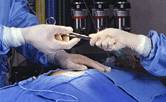 |
 |
 |
||
    |
||||
|
||||

Psychotherapy Can Ease Post-Surgical Depression
Two techniques worked for patients after heart bypass procedures, study finds|
|
HealthDay
By Robert Preidt
Monday, April 6, 2009
 MONDAY, April 6 (HealthDay News) -- Two non-drug treatments -- cognitive behavior therapy and supportive stress management -- seem to be more effective than usual care for treating depression in patients who've had coronary artery bypass graft (CABG) surgery, a new study finds.
MONDAY, April 6 (HealthDay News) -- Two non-drug treatments -- cognitive behavior therapy and supportive stress management -- seem to be more effective than usual care for treating depression in patients who've had coronary artery bypass graft (CABG) surgery, a new study finds.
About 20 percent of bypass patients suffer major depression and another 20 percent experience milder forms of depression, according to background information in the study by Kenneth E. Freedland, of the Washington University School of Medicine in St. Louis, and colleagues.
The study included 123 patients who had major or minor depression one year after bypass. They were randomly selected to receive either usual care (40 patients) as determined by a physician, 12 weeks of cognitive behavior therapy (41 patients), or 12 weeks of supportive stress management (42 patients).
In cognitive behavioral therapy, a psychologist or social worker helped patients identify problems and develop cognitive techniques for overcoming them. In supportive stress management, patients were counseled about how to improve their ability to cope with stressful life events.
All the patients were assessed at the start of the study and again after three, six and nine months. After three months, remission of depression was seen in 71 percent of patients in the cognitive behavior therapy group, 57 percent of patients in the supportive stress management group, and 33 percent of the usual care group.
After nine months, the rates were 73 percent for the cognitive behavior therapy group, 57 percent for the supportive stress management group and 35 percent for the usual care group.
"Cognitive behavior therapy was also superior to usual care on most secondary psychological outcomes, including anxiety, hopelessness, perceived stress and the mental (but not the physical) component of health-related quality of life. On most of these measures, differences between cognitive behavior therapy and usual care were found at all three follow-up assessments. Supportive stress management was superior to usual care only on some of these measures," Freedland and colleagues wrote.
"In conclusion, this randomized, controlled trial showed that cognitive behavior therapy was an efficacious treatment for depression in patients with a recent history of coronary bypass surgery," the researchers said. "Supportive stress management was also superior to usual care for depression in these patients, but it had smaller and less durable effects than cognitive behavior therapy."
The study appears in the April issue of the Archives of General Psychiatry.
HealthDay
Copyright (c) 2009 ScoutNews, LLC. All rights reserved.
Related News:
More News on this Date
Related MedlinePlus Pages:
| Home | Health Topics | Drugs & Supplements | Encyclopedia | Dictionary | News | Directories | Other Resources | |
| Disclaimers | Copyright | Privacy | Accessibility | Quality Guidelines U.S. National Library of Medicine, 8600 Rockville Pike, Bethesda, MD 20894 National Institutes of Health | Department of Health & Human Services |
Date last updated: 07 April 2009 |
